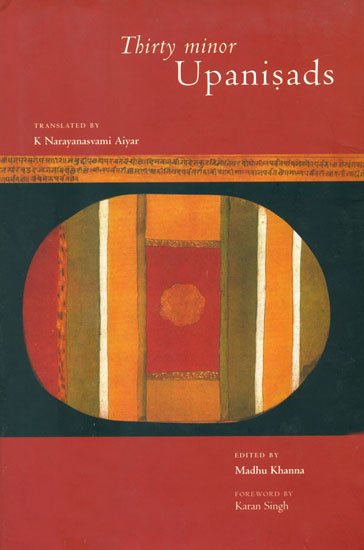Thirty minor Upanishads
by K. Narayanasvami Aiyar | 1914 | 95,228 words
This book contains the English translation of thirty minor Upanishads.—Fourteen belonging to Vedanta, two are categorised as Physiological, three are Mantra, two are Sannyasa and the remaining nine are categorised as Yoga-Upanishads. These Upanishads are properly defined as the Aranya-portion of the Vedas (most ancient Hindu scriptures) and are so-...
Narada Parivrajaka Upanishad of Atharvaveda, Chapter II
All the Ṛṣis, Śaunaka and others addressing Lord Nārada said thus: "O Lord, please tell us the rules of sannyāsa." At which, seeing them, Nārada replied: "It is but meet that we should know the whole truth from the mouth of Brahmā Himself." After the sattra sacrifice was completed, he took the ṛṣis along with him to satyaloka; and after duly making prostrations to and eulogising Brahmā engaged in meditation upon Brahman, he along with others was duly seated under the orders of Brahmā. Then Nārada addressed Brahmā thus: "Thou art guru; thou art father; thou art the knower of the secret of all learning; thou art the knower of all; thou shalt therefore tell me one secret. Who else but thee is fit to tell the secret dear unto me? It is this. Please tell us the rules of the real sannyāsa (asceticism)."
Thus prayed to by Nārada, Brahmā surveyed all in the four quarters; and after meditating for one muhūrta (48 minutes), and assuring himself that the inquiry was truly for the purpose of escaping from the pain of saṃsāra, Brahmā eyeing Nārada, said thus: "The mystery that was imparted before by Virāt-Puruṣa of illimitable form according to the Puruṣa-Sūkta-Upaniṣad is now being divulged to you. It is very mysterious. It is fit to be hearkened to with great attention. O Nārada, one born in a good family and obedient to his parents, should, after the performance of upanayana according to the rules, find a virtuous guru that is other than his father, is of good custom and habits, of faith, born of good family, a knower of Vedas, a lover of Śāstras, of (good) qualities and free from duplicity. Having made prostrations and rendered useful service to him, he should respectfully acquaint him with his intention. Having studied all departments of knowledge and rendered service for twelve years, he should, under his (the guru's) orders, marry a girl fit for his family and dear unto him. Then having performed for twenty-five years the karmas incidental to a householder and attained the status of a Brāhmaṇa that has performed sacrifices and the rest, he should beget a son with the only desire of perpetuating the family. After thus spending twenty-five years in the performance of household dharma, he should bathe thrice daily for twenty-five years and take only one meal in the fourth period; he should live alone in the forest, after giving up his previous wanderings in city and village; and without desire for fruit, should perform the karmas incidental to that (forester's) order .of life, and be without desire for objects seen and heard. Being skilled in the forty saṃskāras, he should be devoid of desire for all, have a purified mind, have burnt up desire, jealousy, envy and egoism, and have developed the four means of salvation. Then he becomes fit for sannyāsa. Such is the Upaniṣad."
